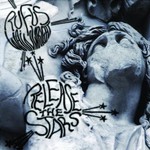Release the Stars
Studio Album by Rufus Wainwright released in 2007Release the Stars review
Rufus Wainright: the brightest representative of baroque pop
If you like pop music and opera than you will definitely love songs of Rufus Wainright. It must be admitted that this person posses an evident talent for genres' crossbreeding. Of course, a combination of pop, rock and classic music is not a new thing, actually it all started at The Beatles times, but judging by the situation we have today the number of really bright artists working in this genre is quite small and besides the majority of them are standing somewhere in the ranks of numerous indie rockers. But if baroque pop represented by such bands as The Arcade Fire or The Decembrists carries a fairy character and their music overall is based on rock than Rufus Wainright proceeds from the absolutely opposite things. First of all he is an avid opera fan and secondly he is well in with celebrities' elite and for example he is friends with such a super popster as Elton John. Therefore his musical version represents baroque pop from the entirely different side, which is much more romantic, touching and theatrical. Wainright became especially successful in 2004 after his most popular album Want Two was released. He spent the following years in never-ending concerts and tours to give it an appropriate support. And now staying on the crest of his fame Wainright releases his new album Release The Stars, which is quite capable to solidify his starry status once and for all.
Wainright doesn't try to leave the boarders of his style
Just like it was expected, the majority of songs represented on Release The Stars are graceful pop driven pieces that combine affecting vocal tunes and divers arrangements and instruments. The first song Do I Disappoint You is a good demonstrating example. It has magnificent melodies and the arrangement is richly decorated with the strings and brass instruments. The song is so noticeable against all the rest because there are no those classic rock instruments, that have been used throughout the album. Wainright frequently combines orchestration with guitar and piano. Tiergarten is something of that kind; actually the song sounds quite characteristic for the majority of the album's context. This is an unhurried half ballad with a sparsely notable flavor of cabaret music. Here Wainright decided to make the arrangement even more original and added soft synthesized beat that sounds quite appropriate and very unobtrusively against all the odds. In fact, the album has a fair amount of ballads if one may call them so of course, in particular you may pay attention on Not Ready To Love. Sometimes Wainright makes use of old rock's legacy. Between My Legs for example starts with a slightly crunchy guitar that plays a sunny funky riff and then gradually develops into a full-fledged foot stomping hit song in the vein of rock albums recorded with grand orchestras.
Release The Stars benefits due to the quality of material
Despite being an American by origin Wainright recorded his album in Europe: partly in Berlin and partly in London. The fact that the role of executive producer was taken by Pet Shop Boys' leader Neil Tennant is also noteworthy. Therefore it is not hard to suppose that Release The Stars has absolutely not-american sound, there is no that characteristic polished massiveness here. This is good on one hand and not quite good on the other. It is good because the album escaped the lot of standing in one line with the typical sound of those albums that different super stars usually record together with orchestra. It is bad because sometimes the lack of grandeur that is so characteristic for classical music is almost tangible. However, it is quite possible tat Wainright avoided this kind of sounding on purpose; his songs sound mostly calm, he doesn't use temper drops that often and his voice rarely takes high notes staying most of the time in a low register. But despite production's small failure the album benefits by its material – the songs sound very original and self-sufficient even regardless a long list of stylistic influences, which varies from classics to pop and even to indie rock.

